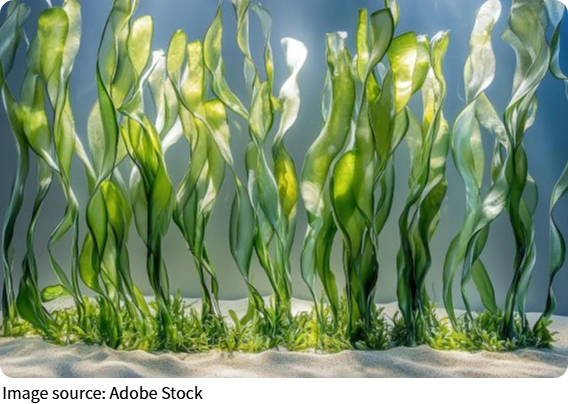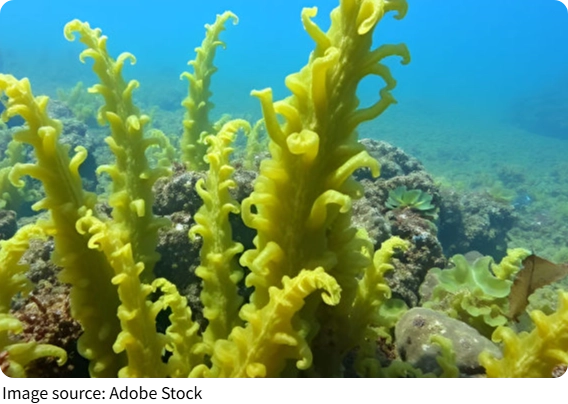Kelp: Plant or Algae?

Have you ever wondered if kelp is a plant or an algae? It's a common question, and one that has puzzled many, especially because kelp plays such an important role in marine ecosystems.
Whether you've seen it floating in the ocean or on your plate as part of a healthy dish, kelp is often associated with both plants and algae. But what is it really?
In this article, we'll explore this interesting topic and break down the science to give you a clear answer. Ready? Let's dive into the world of kelp!
What is Kelp?
Kelp is a type of large, brown marine algae found in coastal regions around the world. Unlike small, single-celled algae, kelp forms dense underwater forests in shallow waters. These "kelp forests" are teeming with life, providing food and shelter to a wide variety of marine species, from fish to sea otters. Kelp grows in cool waters, typically in areas with nutrient-rich, upwelling zones, where the water is full of life-supporting minerals.
One of the key features that sets kelp apart from other types of algae is its large size. Some species of kelp can grow up to 2 feet per day, and their long, leafy structures can reach lengths of up to 200 feet! This rapid growth rate and size make kelp one of the largest and most complex forms of algae.
The Difference Between Plants and Algae
So, is kelp a plant or an algae? To answer that question, we need to understand the key differences between plants and algae. Both plants and algae are photosynthetic organisms, meaning they use sunlight to produce food. However, they differ in their structure, reproduction, and where they grow.
• Plants: Generally, plants have roots, stems, leaves, and vascular tissue, which is responsible for transporting water and nutrients. Most plants grow on land, though some, like seagrasses, grow in shallow marine environments.
• Algae: Algae, on the other hand, don't have complex vascular systems. They lack true roots, stems, or leaves. They can be found in a variety of environments, from freshwater to saltwater, and can range in size from microscopic phytoplankton to the massive kelp forests we mentioned earlier.
So, while kelp may look like a plant in many ways (due to its long, leafy structures), it is, in fact, a type of algae. More specifically, kelp is a brown algae, a group of algae known for their large size and complex structure. Unlike plants, kelp does not have roots, stems, or leaves in the traditional sense. Instead, kelp has specialized structures:
• Holdfast: This is the root-like structure that anchors the kelp to the ocean floor.
• Stipe: The stem-like part that provides structure to the kelp.
• Blades: The leafy structures that capture sunlight for photosynthesis.
Why Is Kelp So Important?
Despite being categorized as algae, kelp plays a crucial role in the environment, much like land plants do. In fact, kelp forests are often referred to as the “rainforests of the sea” due to their biodiversity. These underwater forests are home to thousands of marine species, offering food, shelter, and a place to breed.
Kelp also plays an important role in the carbon cycle. Through photosynthesis, it absorbs carbon dioxide, helping to reduce greenhouse gases in the atmosphere. Additionally, kelp can help protect coastlines by absorbing wave energy, reducing coastal erosion.
Interestingly, kelp is also valuable to humans. It is a common ingredient in food products like sushi and soups, particularly in Asian cuisine. Kelp is also harvested for its high nutrient content, especially its rich supply of iodine, which is essential for thyroid function.

Conclusion: Kelp, the Mighty Algae!
In conclusion, kelp may look like a plant, but it is indeed an algae—more specifically, a brown algae. Its unique structure and ability to thrive in underwater environments set it apart from true land plants. Despite not having roots, stems, or leaves in the traditional sense, kelp plays a vital role in marine ecosystems and even contributes to human life in various ways. The next time you see a kelp forest or enjoy a dish with kelp in it, you'll have a deeper understanding of this amazing organism.
Now that we've uncovered the mystery of kelp, we'd love to hear your thoughts. Did you already know that kelp is algae, or were you surprised to learn this? Let us know in the comments!
-
 Unlock Cozumel’s Ocean MagicThink paradise ends at the beach? Dive into Cozumel’s depths for heart-racing views and unforgettable moments!
Unlock Cozumel’s Ocean MagicThink paradise ends at the beach? Dive into Cozumel’s depths for heart-racing views and unforgettable moments! -
 Self vs. SchoolingCan Self-Learning Build Better Thinkers Than Traditional Classrooms? Let's Compare the Real Impact on Independent Minds
Self vs. SchoolingCan Self-Learning Build Better Thinkers Than Traditional Classrooms? Let's Compare the Real Impact on Independent Minds -
 Comic Adaptation JourneyFrom Page to Screen—Why Do Some Comic Book Movies Win Our Hearts While Others Miss the Mark?
Comic Adaptation JourneyFrom Page to Screen—Why Do Some Comic Book Movies Win Our Hearts While Others Miss the Mark?